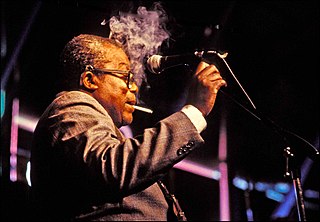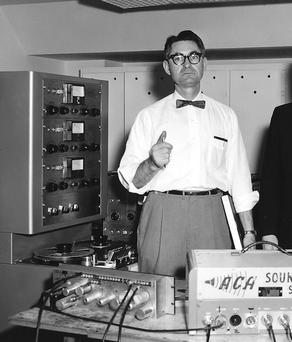
Elmore James was an American blues guitarist, singer, songwriter, and bandleader. Noted for his use of loud amplification and his stirring voice, James was inducted into the Rock and Roll Hall of Fame in 1992. His slide guitar technique earned him the nickname "King of the Slide Guitar".

Alex or Aleck Miller, known later in his career as Sonny Boy Williamson, was an American blues harmonica player, singer and songwriter. He was an early and influential blues harp stylist who recorded successfully in the 1950s and 1960s. Miller used various names, including Rice Miller and Little Boy Blue, before calling himself Sonny Boy Williamson, which was also the name of a popular Chicago blues singer and harmonica player. To distinguish the two, Miller has been referred to as Sonny Boy Williamson II.

John Lee Curtis "Sonny Boy" Williamson was an American blues harmonica player, singer and songwriter. He is often regarded as the pioneer of the blues harp as a solo instrument. He played on hundreds of recordings by many pre–World War II blues artists. Under his own name, he was one of the most recorded blues musicians of the 1930s and 1940s and is closely associated with Chicago producer Lester Melrose and Bluebird Records. His popular songs, original or adapted, include "Good Morning, School Girl", "Sugar Mama", "Early in the Morning", and "Stop Breaking Down".

Theodore Marcus "Teddy" Edwards was an American jazz tenor saxophonist.
The American Folk Blues Festival was a music festival that toured Europe as an annual event for several years beginning in 1962. It introduced audiences in Europe, including the UK, to leading blues performers of the day such as Muddy Waters, Howlin' Wolf, John Lee Hooker and Sonny Boy Williamson, most of whom had never previously performed outside the US. The tours attracted substantial media coverage, including TV shows, and contributed to the growth of the audience for blues music in Europe.

Samuel Joseph Myers was an American blues musician and songwriter. He was an accompanist on dozens of recordings by blues artists over five decades. He began his career as a drummer for Elmore James but was most famous as a blues vocalist and blues harp player. For nearly two decades he was the featured vocalist for Anson Funderburgh & the Rockets.

"Dust My Broom" is a blues song originally recorded as "I Believe I'll Dust My Broom" by American blues artist Robert Johnson in 1936. It is a solo performance in the Delta blues-style with Johnson's vocal accompanied by his acoustic guitar. As with many of his songs, it is based on earlier blues songs, the earliest of which has been identified as "I Believe I'll Make a Change", recorded by the Sparks brothers as "Pinetop and Lindberg" in 1932. Johnson's guitar work features an early use of a boogie rhythm pattern, which is seen as a major innovation, as well as a repeating triplets figure.
Lillian Shedd McMurry was one of the earliest American female record producers and owner of Trumpet Records. She was influential in the development of blues music, particularly through her recordings of Sonny Boy Williamson II and her discovery of the guitarist Elmore James.
The Mississippi Musicians Hall of Fame, headquartered in Clinton, Mississippi, honors Mississippi's famous musicians. It is a "Who's Who" of the blues, rock and roll, and jazz from their beginnings to present day. The organization's museum is located in the Jackson–Evers International Airport in Jackson, Mississippi.
Luke McDaniel, who also recorded under the stage name Jeff Daniels, was an American country and rockabilly music singer and songwriter. He was the grandfather of Mississippi state senator Chris McDaniel.
Document Records is an independent record label, founded in Austria and now based in Scotland, that specializes in reissuing vintage blues and jazz. The company has been recognised by The Blues Foundation, being honoured with a Keeping the Blues Alive Award in 2018. Document Records is the only UK-based recipient of the award.
Eugene Floyd Phillips was an American jump blues guitarist and singer.

Henry Bernard Glover was an American songwriter, arranger, record producer and trumpet player. In the music industry of the time, Glover was one of the most successful and influential black executives. He gained eminence in the late 1940s, primarily working for the independent King label. His duties included operating as a producer, arranger, songwriter, engineer, trumpet player, talent scout, A&R man, studio constructor, while later in his career he became the owner of his own label. Glover worked with country, blues, R&B, pop, rock, and jazz musicians, and he helped King Records to become one of the largest independent labels of its time. Thanks to the efforts of family, friends and fans, Glover's hometown of Hot Springs, Arkansas celebrated the 100th anniversary of his birth in 2021 by inducting him into the downtown "Walk of Fame," the Mayor's "Proclamation," "Key to the City," and named a parklet "Henry Glover Way," along Black Broadway after him. In 2018, Glover was recognized with a Lifetime Achievement Award by the King Records 75th Anniversary. In 2013, he was inducted into the Blues Hall of Fame.
Willie Love Jr. was an American Delta blues pianist. He is best known for his association with and accompaniment of Sonny Boy Williamson II.
"Sugar Mama" or "Sugar Mama Blues" is a blues standard. Called a "tautly powerful slow blues" by music journalist Charles Shaar Murray, it has been recorded by numerous artists, including early Chicago bluesmen Tampa Red, Sonny Boy Williamson I, and Tommy McClennan. John Lee Hooker and Howlin' Wolf later adapted "Sugar Mama" for electric blues and rock group Led Zeppelin reworked it during early recording sessions.

William Dwight Holford, Sr. was an American recording engineer and record producer. For 44 of those years, from 1948 to 1982, he was the affiliated with ACA Studios in Houston as an owner, partner, and audio engineer. Holford also helped build studios for several labels, including Duke/Peacock, Starday, Sarg Records, and Trumpet Records.
Elmore James was an American blues slide guitarist and singer who recorded from 1951 until 1963. His most famous song, "Dust My Broom", an electrified adaptation of a Robert Johnson tune, was his first hit and features one of the most identifiable slide guitar figures in blues. James' composition "The Sky Is Crying" and his rendition of Tampa Red's "It Hurts Me Too" were among his most successful singles on the record charts. Other popular James songs, such as "I Can't Hold Out", ""Madison Blues", "Shake Your Moneymaker", "Bleeding Heart", and "One Way Out", have been recorded by several other artists, including Fleetwood Mac, Jimi Hendrix, and the Allman Brothers Band.
Houston Davis was an American composer, arranger, teacher of music, dance band drummer, and later in his career, a justice of the peace in Hinds County, Mississippi.

Alamucha is an unincorporated community in Lauderdale County, Mississippi, United States.
"Too Many Drivers" is a blues song recorded by Big Bill Broonzy in 1939. It is performed in an acoustic ensemble-style of early Chicago blues and the lyrics use double entendre often found in hokum-style blues songs. The song has been identified as one of Broonzy's more popular tunes and has been recorded over the years by a variety of artists, who often who use alternate titles, such as "Little Car Blues", "Little Side Car", "Automobile Blues", and "Let Me Ride Your Little Automobile".









